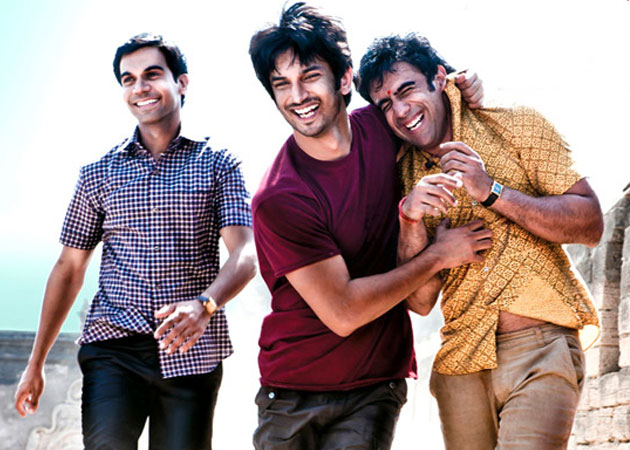By Barnali Dasverma

This was the first thought that crossed my mind when asked if I wanted to spend an afternoon watching “Kai Po Che.” I was skeptical of what I feared was yet another feel-good Bollywood flick about India’s favorite pastime – cricket.
About two hours later, I sat in stunned silence, impressed and truly moved by this powerful film. “Kai Po Che,” directed by Abhishek Kapoor, is a highly compelling drama that explores life in Gujarat at the turn of the century – including the devastating 2001 earthquake and tragic 2002 Godhra Hindu/Muslim riots – through the lives of three friends who open a cricket shop and training center together.
“Kai Po Che” does an impressive job of telling the story of three friends – the thoughtful and serious Govind (Raj Kumar Yadav), the hot-tempered and gifted cricketer Ishaan (Sushant Singh Rajput), and the agreeable and good-natured Omi (Amit Sadh) – as they pursue their dream of opening a sporting goods store and cricket training center in their hometown of Ahmedabad, Gujarat. The film is based on a book by Chetan Bhagat called “The 3 Mistakes of My Life.”
The movie, which is increasingly intense towards the end, is not without its “feel good” storylines. Ishaan discovers a child cricket prodigy and convinces the boy’s father to let him begin training at the cricket center to nurture his talent. Govind befriends a young woman he tutors, and, in a genuinely believable storyline, their friendship blossoms into romance as they become each other’s confidantes.
The most compelling element of “Kai Po Che” is that it is an incredible piece of historical fiction. Through the lives of Govind, Ishaan, and Omi, we as viewers witness the destruction of the 2001 Gujarat earthquake and the devastation it causes. The friends’ new shop is destroyed and leaves them heavily in debt. Around them, those less fortunate – including cricket prodigy Ali – are left without food or shelter. Learning about historical events this way is much more emotional and touching than reading about it in the news – because as we become invested in the stories of these well-developed characters, their pain becomes ours.
In a tragic finale, the Godhra Hindu/Muslim riots that left thousands dead directly impact the lives of the three main characters. “Kai Po Che” masterfully deals with multiple topics including Hindu fundamentalist politics, mob violence, revenge, and ultimately, forgiveness.
While “Koi Po Che” is not without its faults – there are some unnecessary and unresolved storylines, for example – it is overall an excellent film that should impress both Western and South Asian audiences. It deftly explores modern history in a way that leaves the viewer moved, emotionally drained, and yet wanting to learn more about this dark part of recent Indian history.
Have you watched Kai Po Che? If so, share your thoughts with us on the film below.
Barnali lives in San Francisco and enjoys exploring new SF restaurants, going to the theater, reading fiction, and traveling internationally. She is also Scuba certified. Barnali holds both a BA and MA from Stanford University.



 Backyard Pyar: A Unique Dating Experience for South Asian Singles
Backyard Pyar: A Unique Dating Experience for South Asian Singles Ringing in Change: Sakhi’s Historic Achievement
Ringing in Change: Sakhi’s Historic Achievement Good Indian Girl, Sort Of: Sonya Soni
Good Indian Girl, Sort Of: Sonya Soni